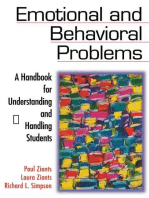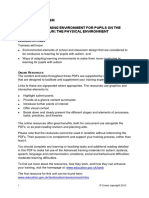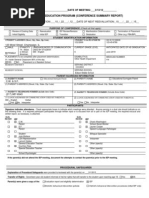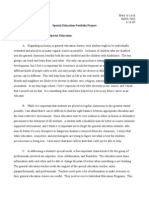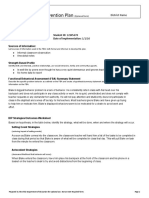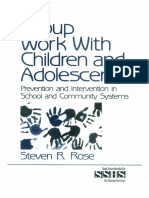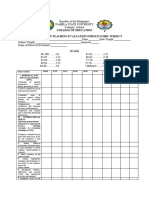Running Head: IEP CASE STUDY 1
Running Head: IEP CASE STUDY 1
Uploaded by
api-273876747Copyright:
Available Formats
Running Head: IEP CASE STUDY 1
Running Head: IEP CASE STUDY 1
Uploaded by
api-273876747Original Title
Copyright
Available Formats
Share this document
Did you find this document useful?
Is this content inappropriate?
Copyright:
Available Formats
Running Head: IEP CASE STUDY 1
Running Head: IEP CASE STUDY 1
Uploaded by
api-273876747Copyright:
Available Formats
Running head: IEP CASE STUDY
IEP Case Study
Caitlin Carr
Towson University
IEP CASE STUDY
PART I
I.A.I
The IEP process at Thomas Johnson Elementary/ Middle school includes five important
steps. 1. Referral for a Special Education Evaluation, if you suspect that the student has a
disability and after attempting interventions, he or she continues to struggle both at school and at
home, you should refer your child for an evaluation. 2. The Evaluation, The special education
evaluation or assessment provides the IEP team information that will be used to determine if
your child has one of the 13 types of eligible disabilities defined by IDEA and therefore qualifies
them for special education services. 3. Determining Eligibility, criteria states that to qualify for
special education services, a child must have one of the 13 disabilities as defined by IDEA AND
the impact of the disability must create a need for services. 4. Writing the Individual Education
Program, an individualized education program (IEP) will be written at the eligibility meeting if
your child has been found to be eligible for special education services.5. The IEP Meeting,
meeting is held in a private or semi-private location. Introductions take place before the meeting
begins. At every meeting, parents receive a copy of your procedural safeguards (parent rights),
and be asked to sign a form stating you have received them and that you have no questions. The
IEP team is usually made up of the following, Special Education Teacher, General Educator,
Other General Education Teachers, School Psychologist, any other Specialists, School
Administrator, the Parent, the Child (if child is over the age of 8). The team will discuss students
current level of performance, concerns, assessment results, Teacher reports, Psychological testing
results, Speech and language results if appropriate, or any Counseling input if appropriate. Once
the results are revealed, the IEP chair will make a recommendation regarding the child's
eligibility for special education services. The IEP team must then agree or disagree with this
recommendation. If eligibility has been agreed upon, the special education teacher will present
IEP CASE STUDY
the written plan at the meeting. This will contain the students goals, objectives, modifications
and accommodations. Each area will be explained to the parents along with the services that the
child will receive in order to achieve these goals. At the end of the IEP meeting, a form will be
filled out by team participants. If the parent(s) do not agree with the IEP team's
recommendations, the team will need to determine the next step. This may include the following
additional testing, Independent Education Evaluation (IEE), mediation, Due Process, or
Advocacy Services.
The Individuals with Disabilities Education Improvement Act of 2004 (IDEA) is a United
States law that mandates justice, liability and quality in education for children with disabilities.
According to my observations and discussion with my mentor, Thomas Johnson Elementary/
Middle School professionals obey and respects the law IDEA. The IEP chair ensures every
student that qualifies for services receives an IEP that encompasses annual goals, short term
goals, educational progress, special education and related services, accommodations, and
alternative assessments, and transitions. All IEP team members must agree on IEP for each
particular student. Each IEP team must review and revise all IEP annually to ensure student
progress. Procedural Safeguards Notice is disturbed once year during an initial or annual review
meeting.
A discussion was held between my mentor and me to discuss the individual learning and
behavioral needs of the student as related to her disability and need for special education
services. The student is a 6 year old student in a kindergarten class at Thomas Johnson
Elementary Middle School. She attended pre-kindergarten at Thomas Johnson during the 20132014 school year. She received speech/language therapy at Thomas Johnson since she was 3
years old. This is an annual review to discuss the students progress in school.
IEP CASE STUDY
In the beginning of the year, the students assessments showed that she was on grade
level for DIBELS (letters and sounds) and below grade level expectations in TRC (text reading
comprehension). She has made some progress from beginning of year to middle of year
assessments. She is now slightly below grade level for DIBELS and below grade level for TRC,
but did increase one reading level.
The Parents and my mentor have discussed her impulsivity and behavior issues in the
classroom. They have been diligent in getting her additional assessments through Kennedy
Krieger Institute. There, she was recently diagnosed with ADHD and began taking medication
for it. We have seen improvements with her behavior and relationships with others. There has
not been further in class assessments at this point to see an effect of medication on her academic
achievement.
On February 12th at 8:15 a.m., an IEP meeting was held for a student who has a speech/
language impairment. This meeting was her annual review. The IEP chair called the students
Behavioral Therapist because the parents wanted the therapist to be involved in the team. The
meeting began with everyone introducing themselves and signing in. Mom, Dad, Special
Educator/ General Educator, Speech/Language Pathologist, Behavioral Therapist, and Intern
were present for the meeting. The IEP chair provided parents a copy of the Procedural
Safeguards and Parental Rights document. The Parents were provided a verbal and written
explanation of the parents' rights and responsibilities in the IEP team process. The Parents were
provided verbal and written information about access to services, including a copy of the
Maryland Insurance Administration's Parents' Guide to Services.
IEP CASE STUDY
The students Parents wanted to voice their concerns about their childs academics. The
Parents updated the team that the student is now on medication for ADHD. The Parents and
Teacher noted students ability to stay on task and focus has improved greatly since being on
medication. Parent is concerned with students reading comprehension and learning
developmental delays. The Special/ General Educator informed both parents that she did move
up a level in reading since starting her medication. Parents informed the team on March 11, the
student will be going for neurological testing at Kennedy Krieger Institute.
The Special/ General Educator expressed how the student is progressing in academics
because she is able to focus on tasks for a longer period of time. The Students behavior, social,
and emotional skills have improved over the course of the year. The Student is below grade level
in reading; however, as stated earlier, student moved up a letter in reading and moved up in
reading groups. The Students foundation skills have increase such as tapping and blending. The
Students self-esteem has increased over the last year. The Parent stated the student used to play
alone on the playground now, the student will play with her peers and attend birthday parties and
play dates. The Speech/ Language Pathologist stated the student is making excellent progress
with articulation skills, observes frustrations when student is talking and cannot think of the
correct words to use. The Student also demonstrates grammatical errors in connection to her
speech. Based on current progress reports, work samples, informal assessments, and
observations, the student is having difficulty acquiring basic Kindergarten skills; such as problem
solving, following 2- step directions, paying attention for longer than 15- 20 minutes, and
retelling a story that has been read aloud. Since student is having difficulty with basic
Kindergarten skills the team wants to order additional testing to evaluate the students current
IEP CASE STUDY
strengths and weaknesses. The team will then meet again to discuss results and develop new
goals to address current needs.
The team revised the IEP with a goal and objective that target the sounds /v/ and
voiceless /th/ in sentences and in conversation. The team agreed to order additional testing for
Educational, Receptive and Expressive Language, Observation, Cognitive, and Psychological in
order to determine current levels of performance and to assist in writing an IEP that state current
needs. Based on the results of testing, the team will meet again to discuss to determine what will
be needed for the student to have academic success.
On February 19, 2015 at 8:15 a.m., an IEP meeting was held to order testing and receive
parent consent. The Parent was unable to attend the meeting so, the IEP chair called the Parent so
she can be involved in the meeting. The IEP Team introduced them-selves; the team consisted of
the Parent, Special/ General Educator, IEP chair, Intern, and Speech/ Language Pathologist.
The IEP chair sent home a copy of the Procedural Safeguards and Parental Rights
document with the student that day. The Parent was provided a verbal and written explanation of
the parents' rights and responsibilities in the IEP team process. Parent was provided verbal and
written information about access to services, including a copy of the Maryland Insurance
Administration's Parents' Guide to Services. IEP chair informed Parent to read and know her
rights.
The IEP chair informed Parent about consent to testing and how it is confidential.
Speech and Language testing will be performed on students articulation. The Parent questioned
what testing will be performed. The Parent stated the student refuses to do homework or projects
IEP CASE STUDY
with her. The Student will act like she didnt learn the material or will become mute when asked
questions. The Parent stated the Student talks very fast and mumbles at home. The Parent
indicated she has a difficult time understanding the students speech. The Students /s/ sounds are
extremely unclear and hard to understand. The Special/ General Educator stated the Student is in
the lowest reading group in the class. It is hard to understand the speech of the student because of
her weak articulation skills. However, student is determined for you to understand so student will
repeat until you understand.
The Speech/ Language Pathologist will test to the student and then the team will
determine if she qualifies for services.
The Parent stated student has been getting sick more frequently since being in
Kindergarten. Parent believes students immune system is becoming adjusted to the school
environment. The Special/ General Educator stated absents arent effecting any academics in the
classroom. The IEP chair informed the Parent about the CHIP program; a program for students
who have a chronic illness and a teacher will come to students home to teach student. The Parent
informed the IEP chair; the family may be moving to Virginia and was asking questions if
student will be retested if they move. The IEP chair informed the Parent of the relocating
process. Bring a copy of the IEP to the new school and they must implement IEP into the school.
The team will reconvene when the testing is complete to determine if the student qualifies
for services.
1.A.2
Thomas Johnson Elementary/ Middle School IEP chair and I worked collectively on
coordinating the IEP process for the case study. Together we contacted the Parents of the student
IEP CASE STUDY
to organize an IEP meeting to discuss the students annual review and to discuss any concerns the
team has. The Parents and the IEP found a date and time that would work best for everyone.
Then the General/ Special Educator, Speech Pathologist, and Behavioral Therapist were
informed the students IEP annual review meeting.
IIB.1
Background Information
Reason for Referral
IEP Annual Review date: 02/12/2015
Specify the area(s) identified for reevaluation:
Annual Review: Speech or Language Impairment
Early Academic Skills
Discussion to support decision:
o Based on current progress reports, work samples, informal assessments, and
observations. Student is having difficulty acquiring Basic Kindergarten Skills.
o The IEP Team agreed to order assessments Educational, Cognitive, and
observation in order to determine if student may benefit from Special Education
Services.
o The IEP Team suspects a possible learning disability.
Pre-referral Strategies werent performed for this specific child at this time due to
annual review. The team ordered assessments to determine if student may benefit from
special education services.
A Timeline of the Process:
IEP Team meeting date(s): 03/29/2012, 03/08/2013, 02/25/2014, and 02/12/2015.
Category of Disability, Date special education and related services were
implemented
Primary Disability: Speech or Language Impairment
Areas affected by disability: Academic - Speech and Language Articulation
IEP CASE STUDY
Start of the Services: 02/13/2015
End Date of Services: 02/11/2016
Types of Services Provided
Speech/Language Therapy services are provided by a Speech/Language Pathologist outside of
the classroom for 30 minutes once a week for 36 weeks. The Speech/ Language Pathologists
expert judgment will determine the mode of service delivery, EG. Small Group or Individual
therapy.
A Summary of Relevant Family or Medical History
Student was diagnosed with ADHD and is now on medication to help her focus.
A Brief Summary of the Students Learning and Behavioral Characteristics
Student is friendly and cooperative and also is respectful to authority. Student is does well with
routine and has a very good memory. Student has good self-help skills and follows directions.
Student is on medication to help student focus on tasks.
Cultural and Linguistic Differences
Student identified as Limited English Proficient: No
Student's native language: Russian
Language Development
Speech or Language Impairment: Articulation
Observation by service providers does indicate presence of emerging skills in Articulation
delays. Student is making significant progress with overcoming articulation errors.
(SPEECH/LANGUAGE PATHOLOGIST REPORT, OBSERVATION, IEP REVIEW, TEAM
DISCUSSION, 02/2015)
Discuss the above with their relationship to the determination of eligibility and
provision of special education and related services
Based on Parent input, Speech/Language Pathologist and General Educator progress reports,
observation, 2/2015 the student is making excellent progress with her articulation skills. Student
produces the target sounds, /V/ and voiceless /TH/, in words, phrases, and sentences. Student is
working consistently producing the target sounds during conversational speech and unstructured
activities.
Students articulation delays have impacted clear communication with peers and adults,
connected speech can be difficult to understand. She demonstrated some grammatical errors in
connected speech. Student has some frustrations when she is talking and cannot think of the
correct word to use.
IEP CASE STUDY
10
II.B.2
Statement of Present Levels of Academic Achievement and Functional Performance
Based on informal assessments and clinical notes, Student has demonstrated excellent progress
in her articulation skills. Student has achieved the following objectives: 1) Given visual
representations of the target sounds, /v/ and voiceless /th/, Student will produce the target sounds
in words, phrases and sentences; 2) Given visual representations of the target sounds, /v/ and
voiceless /th/, Student will produce the sounds in in sentences. Despite her progress, Student has
difficulty consistently producing the target sounds during conversational speech and unstructured
activities. The students disability doesnt affect the childs involvement and progress in the
general curriculum/or preschool appropriate activities. She has made some progress from
beginning of year to middle of year assessments.
II.B.3
Statement of Measurable Annual Goals, including Academic and Functional Goals
Based on Team Discussion, proposed IEP, and observation, 02/2015, Student will continue to
access the general curriculum in the general education setting with supports from educators for
basic Kindergarten skills and articulation delays.
Goal: Academic - Speech and Language Articulation
By February 2016, given visual representations of target sounds, Student will improve speech
intelligibility by producing the /v/ and voiceless /th/ during unstructured activities and during
conversational speech with 80% accuracy as measured by informal assessments, observation
and clinical notes. By: 02/09/2016
Evaluation Method: Informal Procedures
With: 80 % Accuracy
IEP CASE STUDY
11
Objective 1: Given a question and response activity with embedded target sounds, /v/ and
voiceless /th/, Student will produce target sounds in words, phrases, and sentences.
Objective 2: Given grade level reading material, Student will produce target sounds during an
oral reading activity.
How will the parent be notified of the student's progress toward the IEP goals? IEP progress
report quarterly
How often? Quarterly
Beginning of Services and Modifications: 02/13/2015
Total time in school week: 32 hrs. 30 minutes/week
Total time in General Education: 32 hrs. 00 minutes/week
Total time outside of General Education: 00 hrs. 30 minutes/week
Special education placement (ages 6-21): Average 98.46%/day
INSIDE GENERAL EDUCATION (80% or more)
II.B.4.
Statement of Special Education and Related Services and Supplementary Aids
Student doesnt have any special communication needs. Student does not demonstrate a need
for assistive technology to increase, maintain, or improve functional capabilities.
(OBSERVATION, 02/2015)
Instructional and testing accommodations were considered and no instructional and testing
accommodations are required at this time.
Student will participate in State-Wide and District Wide Assessments beginning in 1st Grade,
assessment requirements are subject to change. Document basis for decision: Instructional and
testing accommodations are not required at this time. Students needs are addressed by her
parents, service providers, and speech therapy.
Student does not require supplementary aids, services, program modifications and supports in
order to access the general curriculum. Her speech needs are addressed by service providers in
her Kindergarten class and in speech therapy.
IEP CASE STUDY
12
Student does not include annual goals that are related to critical life skills. Student is making
excellent progress with improving her articulation skills. (TEAM DISCUSSION, REVIEW OF
IEP, SERVICE PROVIDERS OBSERVATION, 02/2015).
Student will continue to access the general curriculum in the general education setting with
supports from educators for basic Kindergarten skills and articulation delays.
Student participates with non-disabled peers in age-appropriate academic, non-academic,
and extra-curricular activities.
III.C.I
As a result of attending the IEP meetings, I learned a great deal from observing how the
team members interact and what occurs during a meeting. All members from both IEP teams
demonstrated respect for one another and collaborated well in order for the students to be
successful. The participants in both meetings were Parent(s), Special/ General Educator,
Speech/ Language Pathologist, Intern, and Behavioral Therapist.
Parent participation in both IEP meetings were high; for the first meeting both parents
were present and in the second meeting one parent was present via phone. During the first
meeting, the Parent asked if I had any concerns for the student. I told the Parents that the student
is a sweet person and told them a story about their child when I initial had met her. I also
informed both parents that I have only been working with the student for a short amount of time
so; I am still learning students strengths and weaknesses. I did appreciate the Parent asking if I
had any concerns about their child. Even though I am an intern, parents do consider you essential
to their childs academic success. This particular student has been receiving services since the
age of the three so; both parents knew the procedures and expectations of the meeting.
IEP CASE STUDY
13
The second meeting I had met the Parent a few times before the IEP meeting.
Considering this was the initial IEP meeting, the Parent had more questions and concerns than
the other meeting I had attended. The Parent allowed the IEP chair to be more of the leader
because the meetings are new to her.
Timelines were discussed during both meetings. Future meeting dates were discussed to
review assessment results to see if students qualify for services. Both teams have 90 days to
come back and review results of test. The IEP chair informed both teams they have until a certain
date to test and review results.
Procedures and rights were discussed during both meetings. During both meetings, I
observed the procedure of how Thomas Johnson Elementary/ Middle school arrange and manage
IEP meetings. The team sets up a time and date then during the meeting the team introduces each
other to have a professional and welcoming relationship with each other. Parent concerns were
discussed first which allows parents to feel heard and is significant in the meeting. Personally,
this is a great approach to acquire in an IEP meeting; making parents feel heard allows the team
to have a positive relationship. The Parents rights and handbook are discussed to ensure parents
are aware and know their rights. The rest of the teams concerns/ comments are discussed about
the student to develop an IEP. The meeting finishes with the parent(s) and team collaborates to
discuss and analysiss students goals, objectives, and tests that will be performed. The meeting
closes by the IEP chair reinforcing when the team will reconvene to discuss assessment results.
It was a positive and inspiring experience to observe the interactions, collaboration, and
procedures that occur during both meetings.
IEP CASE STUDY
14
You might also like
- Turning Five Student Progress ReportDocument2 pagesTurning Five Student Progress ReportBryan Peterson100% (2)
- Gced Case Manager ChecklistDocument2 pagesGced Case Manager Checklistapi-245944168100% (1)
- Iep Case StudyDocument16 pagesIep Case Studyapi-316958999No ratings yet
- OP-2 Behavior Intervention PlanDocument5 pagesOP-2 Behavior Intervention Planapi-387302253No ratings yet
- Safety Plan Outline: XXXXXDocument5 pagesSafety Plan Outline: XXXXXapi-290018716No ratings yet
- Introduction in CounselingDocument30 pagesIntroduction in CounselingCristina Popescu100% (3)
- Dreams - Interpreting Your Dreams and How To Dream Your Desires - Lucid Dreaming, Visions and Dream Interpretation PDFDocument70 pagesDreams - Interpreting Your Dreams and How To Dream Your Desires - Lucid Dreaming, Visions and Dream Interpretation PDFJshsNo ratings yet
- Human Body System RubricDocument3 pagesHuman Body System Rubricapi-304340733No ratings yet
- Case Study Signature Assignment 675Document11 pagesCase Study Signature Assignment 675api-585472080No ratings yet
- IepcasestudyDocument13 pagesIepcasestudyapi-285055482No ratings yet
- Iep Overview EssayDocument4 pagesIep Overview Essayapi-530012202No ratings yet
- Special Education: A Parent's Quick-Start GuideFrom EverandSpecial Education: A Parent's Quick-Start GuideRating: 2 out of 5 stars2/5 (1)
- Supporting Students with Communication Disorders. A Collaborative Approach: A Resource for Speech-Language Pathologists, Parents and EducatorsFrom EverandSupporting Students with Communication Disorders. A Collaborative Approach: A Resource for Speech-Language Pathologists, Parents and EducatorsNo ratings yet
- Emotional and Behavioral Problems: A Handbook for Understanding and Handling StudentsFrom EverandEmotional and Behavioral Problems: A Handbook for Understanding and Handling StudentsNo ratings yet
- Iep Jonas McdulleyDocument21 pagesIep Jonas Mcdulleyapi-301858064No ratings yet
- Running Head: Assessment Case Study 1Document8 pagesRunning Head: Assessment Case Study 1api-510550952No ratings yet
- Fba Abby Veldink Brooke Ebels Nikki Walsh Caitlin MaasDocument4 pagesFba Abby Veldink Brooke Ebels Nikki Walsh Caitlin Maasapi-354766325No ratings yet
- 17 Physical EnvironmentDocument7 pages17 Physical EnvironmentИвона ШујакNo ratings yet
- Behavior Support PlanDocument8 pagesBehavior Support Planapi-283162304No ratings yet
- Fba Report-3-1Document4 pagesFba Report-3-1api-302642402No ratings yet
- C Majcher - FbaDocument16 pagesC Majcher - Fbaapi-289910399No ratings yet
- Fba Report 1 1 1Document5 pagesFba Report 1 1 1api-356299533No ratings yet
- Iep Final KsparksDocument28 pagesIep Final Ksparksapi-227768635No ratings yet
- Fba Form 1 - Summer ParDocument2 pagesFba Form 1 - Summer Parapi-302628458No ratings yet
- Behavioral Intervention Plan Aug 2014Document2 pagesBehavioral Intervention Plan Aug 2014api-262427772No ratings yet
- Edu356 Fba-2Document4 pagesEdu356 Fba-2api-302319740100% (1)
- Jay Jones IepDocument20 pagesJay Jones Iepapi-709040597No ratings yet
- Iep PaperDocument3 pagesIep Paperapi-283801172No ratings yet
- Nathan Milak - Positive Behavior Support PlanDocument33 pagesNathan Milak - Positive Behavior Support Planapi-297595790100% (1)
- The Case of Jessica Assignment 3Document20 pagesThe Case of Jessica Assignment 3Lara AkinpeluNo ratings yet
- In Choosing Priorities, The IEP Team ShouldDocument4 pagesIn Choosing Priorities, The IEP Team ShouldAprillen Mae Sevilla InocandoNo ratings yet
- Iep Quality ToolDocument18 pagesIep Quality Toolapi-344620605No ratings yet
- FbaDocument4 pagesFbaapi-341414791No ratings yet
- Guidance Asd 08-1Document5 pagesGuidance Asd 08-1api-252404660No ratings yet
- IEPDocument30 pagesIEPCourtney RaiaNo ratings yet
- Special Ed PortfolioDocument11 pagesSpecial Ed Portfoliomjmloch100% (2)
- Edu 361 BipDocument5 pagesEdu 361 Bipapi-270441019No ratings yet
- Reynolds Fba-BipDocument15 pagesReynolds Fba-Bipapi-282194480No ratings yet
- Iep PracticeDocument5 pagesIep Practiceapi-317025674No ratings yet
- FBADocument9 pagesFBANNo ratings yet
- Kleven IepcasestudyDocument24 pagesKleven Iepcasestudyapi-334578880100% (1)
- Fba Part 1Document6 pagesFba Part 1api-224606598No ratings yet
- FbaandbipDocument15 pagesFbaandbipapi-313700169No ratings yet
- Sample Individualized Family Service Program - 1Document4 pagesSample Individualized Family Service Program - 1maryrosefranceduran08No ratings yet
- Annotated BibliographyDocument9 pagesAnnotated BibliographyÎrîsh LyzaNo ratings yet
- Fba 2Document6 pagesFba 2api-263471389No ratings yet
- Sample Case StudypdfDocument12 pagesSample Case StudypdfSITI AISYAH ABD RANINo ratings yet
- Fuba Bip TemplateDocument8 pagesFuba Bip Templateapi-264552550No ratings yet
- Iep PenngseDocument23 pagesIep Penngseapi-336560706No ratings yet
- Fba Complete Case StudyDocument4 pagesFba Complete Case Studyapi-301094873100% (2)
- Intervention Strategies BrochureDocument3 pagesIntervention Strategies BrochureLatoya WhartonNo ratings yet
- Bip For SarahDocument4 pagesBip For Sarahapi-283422107No ratings yet
- Muskegon Area ISD - Functional Assessment/Behavior Intervention FormDocument3 pagesMuskegon Area ISD - Functional Assessment/Behavior Intervention Formapi-209129232No ratings yet
- Nina M. Kurfman: 927 Village Park Way Savoy, IL 61874 (309) 531-3669Document3 pagesNina M. Kurfman: 927 Village Park Way Savoy, IL 61874 (309) 531-3669njohnso8No ratings yet
- Anatomy of An IEP UnderstoodDocument5 pagesAnatomy of An IEP UnderstoodGenevieve GuzmanNo ratings yet
- Fba Selpa TemplateDocument9 pagesFba Selpa Templateapi-417867603No ratings yet
- Accomodation and ModificationDocument5 pagesAccomodation and ModificationYvonneNo ratings yet
- Teacher DispositionsDocument3 pagesTeacher Dispositionsapi-217750594No ratings yet
- Functional Behavioral Assessment: Date: - 3/25/20Document5 pagesFunctional Behavioral Assessment: Date: - 3/25/20api-535946620No ratings yet
- Student Details: Myedbc Competency Based Iep Template V. XiDocument5 pagesStudent Details: Myedbc Competency Based Iep Template V. Xiapi-242937747No ratings yet
- PS7309 ASD Case Study - EditedDocument17 pagesPS7309 ASD Case Study - EditedanthonyNo ratings yet
- Fba BipDocument3 pagesFba Bipapi-218772826No ratings yet
- Essential Dispositions Stage Two Formative Assessment 1 26 06Document1 pageEssential Dispositions Stage Two Formative Assessment 1 26 06api-273876747No ratings yet
- Cailltin Carr 2-24-15Document3 pagesCailltin Carr 2-24-15api-273876747No ratings yet
- Job PlacementDocument1 pageJob Placementapi-273876747No ratings yet
- Artifact 5 Rationale Individualized Education Program Case StudyDocument1 pageArtifact 5 Rationale Individualized Education Program Case Studyapi-273876747No ratings yet
- Artifact 2 Rationale Universal Design For Learning Lesson PlanDocument1 pageArtifact 2 Rationale Universal Design For Learning Lesson Planapi-273876747No ratings yet
- Artifact 4 RationaleDocument1 pageArtifact 4 Rationaleapi-273876747No ratings yet
- Artifact 1 RationaleDocument2 pagesArtifact 1 Rationaleapi-273876747No ratings yet
- Running Head: ESL 1Document55 pagesRunning Head: ESL 1api-273876747No ratings yet
- Artifact 3 RationaleDocument1 pageArtifact 3 Rationaleapi-273876747No ratings yet
- Self and Real Me Questionnaire-1Document3 pagesSelf and Real Me Questionnaire-1Sugandha100% (1)
- Writing Habits AnalysisDocument5 pagesWriting Habits Analysisapi-320808568No ratings yet
- Arts Education and Social-Emotional-June2019-Consortium and Ingenuity PDFDocument48 pagesArts Education and Social-Emotional-June2019-Consortium and Ingenuity PDFGabriella Ibarra100% (3)
- Learning Competency: Identify Aspects of Culture and Society (Ucsp11/12Dcsic-8)Document40 pagesLearning Competency: Identify Aspects of Culture and Society (Ucsp11/12Dcsic-8)Jomar TeofiloNo ratings yet
- 318 2 DiagnosticAssessment MseDocument26 pages318 2 DiagnosticAssessment MsetsanicoNo ratings yet
- Ucsp GRP 3Document4 pagesUcsp GRP 3nanisore ee100% (1)
- Final Draft Research Report 26Document61 pagesFinal Draft Research Report 26jupiter stationeryNo ratings yet
- Thesis On Big Five Personality TraitsDocument8 pagesThesis On Big Five Personality Traitsmelissalongmanchester100% (1)
- Abier Sweis Barakat Resume 2018Document3 pagesAbier Sweis Barakat Resume 2018api-549131970No ratings yet
- Family Engagement and Student SuccessDocument5 pagesFamily Engagement and Student SuccessChona EnvergaNo ratings yet
- Pennestri Et Al 7 1 Anita KiafarDocument21 pagesPennestri Et Al 7 1 Anita KiafarCuidar para CrescerNo ratings yet
- Diana Russell Pornography and Rape A Causal ModelDocument34 pagesDiana Russell Pornography and Rape A Causal ModelHaritha IvanNo ratings yet
- Module 5 in Assessment of Learning 2Document10 pagesModule 5 in Assessment of Learning 2Dhanielle MamucodNo ratings yet
- Group Work With Children and Adolescents Prevention and Intervention in School and Community SystemsDocument200 pagesGroup Work With Children and Adolescents Prevention and Intervention in School and Community SystemsAlguém100% (1)
- Color Oracle - AstrodienstDocument6 pagesColor Oracle - Astrodienstprofilefrisson0mNo ratings yet
- Sociolinguistics and PerceptionDocument13 pagesSociolinguistics and PerceptionClaire YeNo ratings yet
- RESEARCH-QUESTIONNAIRE (1) AdditionalDocument2 pagesRESEARCH-QUESTIONNAIRE (1) AdditionalJudicar AbadiezNo ratings yet
- How To Write A Cause and Effect Essay: The Effects of Sleep DeprivationDocument3 pagesHow To Write A Cause and Effect Essay: The Effects of Sleep DeprivationRimalyn MarrackNo ratings yet
- Bihar Baby Position PaperDocument2 pagesBihar Baby Position PaperFlaminBubbleNo ratings yet
- Evaluation Form For Demo Teaching GMRCDocument2 pagesEvaluation Form For Demo Teaching GMRCmaynard pascualNo ratings yet
- Late Adulthood Social and Personality DevelopmentDocument65 pagesLate Adulthood Social and Personality Developmentnishutha3340No ratings yet
- BOSCH & FUQUA - Cusp and Target Selection - JABA - 2001 PDFDocument3 pagesBOSCH & FUQUA - Cusp and Target Selection - JABA - 2001 PDFWilly BoschNo ratings yet
- EDU Activity 3Document2 pagesEDU Activity 3Justine Wynn EduNo ratings yet
- SpeechDocument3 pagesSpeechAleNo ratings yet
- Arsulo Self AffirmationDocument1 pageArsulo Self AffirmationMARK JOHN ARSULONo ratings yet
- Social and Leadership Course ManualDocument154 pagesSocial and Leadership Course ManualJohn Chezter V. CarlitNo ratings yet
- Brochure (Front Page)Document2 pagesBrochure (Front Page)Job NavarroNo ratings yet













